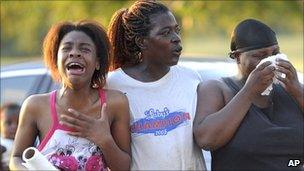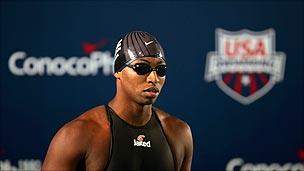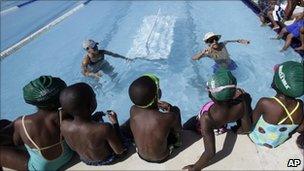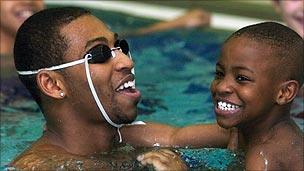Really no excuse not to know how to swim. And you never forget how to swim, it’s like riding a bike once you learn
Why don't black Americans swim?
- Published
- 3 September 2010
Image caption,
The drownings shocked the community and sparked a campaign
By Finlo Rohrer
BBC News, Washington
A month ago, six African-American teenagers drowned in a single incident in Louisiana, prompting soul-searching about why so many young black Americans can't swim.
When 15-year-old DeKendrix Warner accidentally stepped into deeper water while wading in the Red River in Shreveport, he panicked.
JaTavious Warner, 17, Takeitha Warner, 13, JaMarcus Warner, 14, Litrelle Stewart, 18, Latevin Stewart, 15, and LaDarius Stewart, 17, rushed to help him and each other.
None of them could swim. All six drowned. DeKendrix was rescued by a passer-by.
Maude Warner, mother of three of the victims, and the other adults present also couldn't swim.
The US has almost 3,500 accidental drownings every year, almost 10 a day.
But according to the US Centers for Disease Control and Prevention, the fatal drowning rate of African-American children aged five-14 is three times that of white children.
A recent study sponsored by USA Swimming uncovered equally stark statistics.
Just under 70% of African-American children surveyed said they had no or low ability to swim. Low ability merely meant they were able to splash around in the shallow end. A further 12% said they could swim but had "taught themselves".
The study found 58% of Hispanic children had no or low swimming ability. For white children, the figure was only 42%.
"It is an epidemic that is almost going unnoticed," says Sue Anderson, director of programmes and services at USA Swimming.
The swimming body would like all children to be taught to swim.
Parents' responsibility
"We would like it to be like seatbelts and bicycle helmets," says Ms Anderson.
But the situation in the US can vary hugely even within a single state.
Image caption,
Olympic gold medallist Cullen Jones is a spokesman for swimming initiatives
Unlike the UK, where learning to swim is enshrined in the national curriculum except in Scotland, the ultimate responsibility in the US often lies with parents.
"I would love to make it a rule like they have in the UK," says Cullen Jones, a gold medallist in the freestyle 100m relay in Beijing, and a spokesman for USA Swimming's Make a Splash campaign.
"It isn't a requirement, it isn't a priority in the US."
Jones's mother took him to swimming lessons after he nearly drowned at a theme park aged five. By eight he was swimming competitively.
The Make a Splash campaign is targeting all non-swimmers and their parents but there is a particular focus on ethnic minority families.
Fear factor
Many black parents are not teaching their children to swim.
Some might assume the fundamental reasons would be lack of money for swimming lessons or living in areas where there were no pools, but the reality is more complex.
"Fear of drowning or fear of injury was really the major variable," says Prof Carol Irwin, a sociologist from the University of Memphis, who led the study for USA Swimming.
Typically, those children who could not swim also had parents who could not swim.
"Parents who don't know how to swim are very likely to pass on not knowing how to swim to their children," says Ms Anderson.
In focus groups for the study, Prof Irwin said many black parents who could not swim evinced sentiments like: "My children are never going to learn to swim because I'm scared they would drown."
The parents' very fear of their children drowning was making that fate more likely.
The major reason behind the problem could lie in the era of segregation says Prof Jeff Wiltse, author of Contested Waters: A Social History of Swimming Pools in America.
"The history of discrimination… has contributed to the drowning and swimming rates," says Prof Wiltse.
In his work he identified two periods of a boom in swimming rates in the US - in the 1920s and 1930s when recreational swimming became popular and the 1950s and 1960s when the idea of swimming as a sport really took off.
Image caption,
There are historical reasons why black children do not learn to swim
The first boom was marked by the construction of about 2,000 new municipal pools across the nation.
"Black Americans were largely and systematically denied access to those pools," he notes.
"Swimming never became a part of African- American recreational culture."
In the northern US that segregation in pools ended in the 1940s and early 1950s, but many white swimmers responded by abandoning the municipal pools and heading off to private clubs in the suburbs where segregation continued to be enforced.
"Municipal pools became a low public priority," he notes.
After the race riots of the 1960s, many cities did start building pools in predominantly black areas, says Prof Wiltse, but there was still a problem. Many of the new pools were small - often only 20 by 40ft (six by 12m) and 3.5ft (1m) deep.
"They didn't really accommodate swimming. They attracted young kids who would stand in them and splash about. There really wasn't an effort to teach African-American children to swim in these pools."
Although there are many poor or working class white children who cannot swim for similar reasons, swimming has gained an image as a "white sport".
"It is [seen as] a country club sport that only very rich kids get to participate in. The swimming pool is [seen as] a very elitist thing to have in your backyard," says Prof Irwin.
Bishop Larry Brandon, of the Praise Temple Full Gospel Baptist Cathedral, knew the Warner family, and is now persuading other pastors and ministers to use their pulpits to promote swimming.
Shreveport has quickly established a new swimming programme in the victims names and there is a drive to challenge misconceptions about swimming.
As well as the fear factor, Prof Irwin's study found that appearance was also a reason for African-Americans avoiding swimming.
Image caption,
Jones believes progress is being made
Black respondents, far more than white or Hispanic respondents, were sometimes concerned about the effect chlorinated water would have on their hair.
"African-American women, many of them if they go the beauty shop and get their hair fixed they are not going to swim," says Bishop Brandon.
Perhaps the most alarming thing is that the studies suggest that those who cannot swim - like the Warners and Stewarts - often spend time in pools and other swimming sites.
"Kids are going to be by the water, they love being by the water, and that's something that we really need to make a priority," says Jones.
"Here everybody knows how to drive a car. It should also be a rite of passage to learn how to swim."



 crazy how if you put a tablet /phone in kids hands they’d navigate through it like nothing
crazy how if you put a tablet /phone in kids hands they’d navigate through it like nothing



